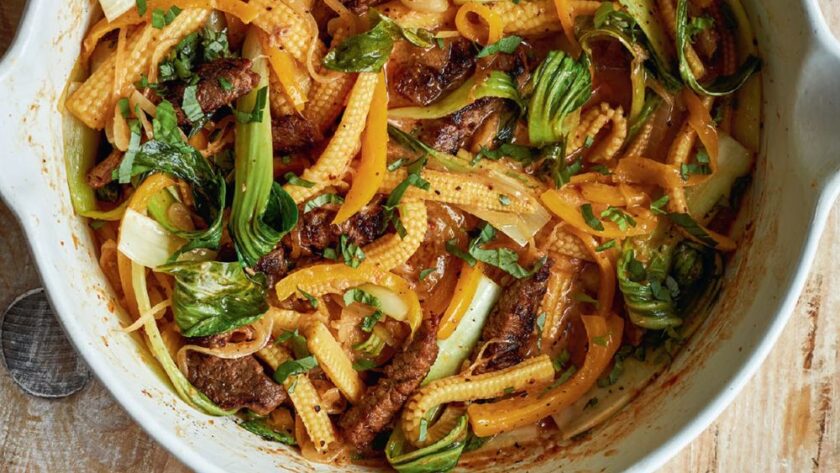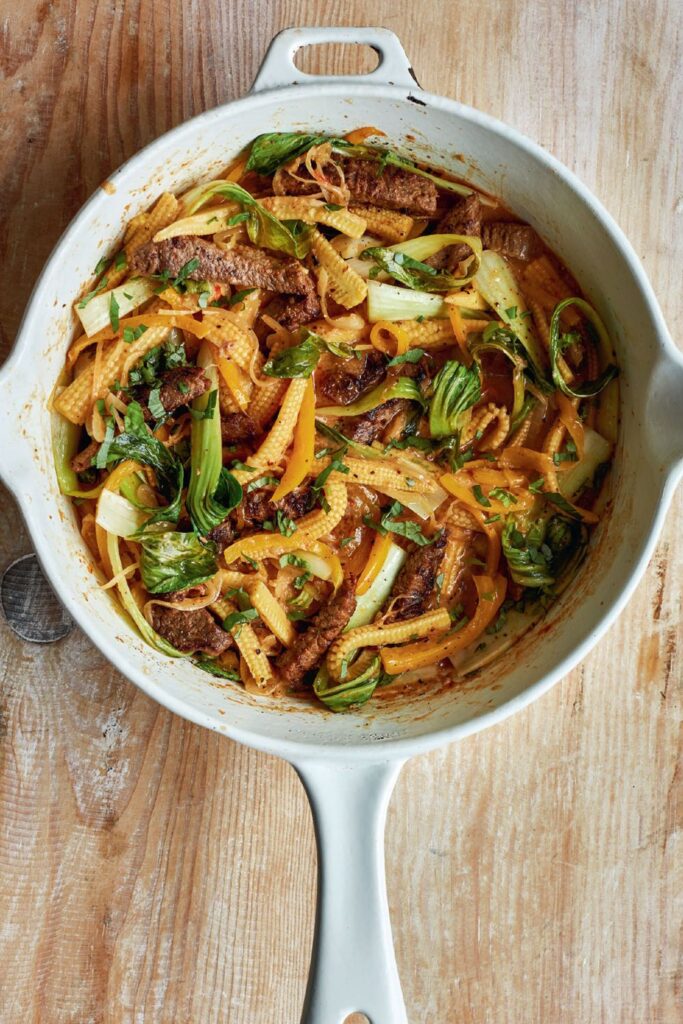Let me be honest—I didn’t expect this one to become a weeknight favourite. Stir-fries always sound easy, but I’ve botched enough to know that they can turn into soggy, bland chaos faster than you can say “overcooked pak choi.”
But this Thai Basil Beef Stir-Fry? It was a game changer. It’s from Mary Berry’s Makes It Easy cookbook, and it really does live up to the title. The creamy coconut-laced sauce, the heat from the red curry paste, the zing of lime, and that herby hit of Thai basil—it all comes together in under 30 minutes. (After marinading, that is. Don’t skip the marinade.)
The first time I made it, I forgot to slice the beef thin enough, and it came out a bit chewy. Since then, I’ve learned the trick is high heat and fast moves. Let me show you what worked.
Why This One Works So Well
- Balanced heat and creaminess: The combo of red Thai curry paste, coconut cream, and lime gives the sauce a rich kick without being overwhelming.
- Quick cooking: Everything cooks hot and fast—no slow stewing or soggy veg. You get colour and crunch.
- Layered flavour: The beef gets marinated before hitting the pan, which builds flavour from the inside out (and avoids the bland meat trap so many stir-fries fall into).
INGREDIENTS + WHY THEY MATTER
- Rump steak – Tender and quick-cooking. Slice it across the grain as thinly as possible, or it’ll go chewy.
- Red Thai curry paste – Adds depth, spice, and colour. I used Mae Ploy brand—if yours is milder, you might want to up it by half a teaspoon.
- Coconut cream – This makes the dish luscious and rich. Coconut milk works too, but it won’t be as thick or glossy.
- Cornflour – Don’t skip it! Helps the sauce cling to every strip of beef and veg.
- Thai basil – The star of the show. It’s got a slight aniseed flavour that elevates the whole thing. Regular basil works in a pinch but isn’t quite the same.
- Sweet chilli sauce & muscovado sugar – Adds that subtle sweet note that balances the spice and savouriness.
Want to Change It Up? Here’s How
- No Thai basil? Use fresh coriander or regular basil if you must, but the authentic flavour really comes from Thai basil.
- Meat swap: Chicken thighs (boneless) work beautifully. Pork shoulder is another great option if sliced thin.
- Vegetarian version: Swap beef for firm tofu or tempeh, and use mushroom sauce instead of fish sauce.
- Make it spicier: Add extra fresh chilli or a pinch of chilli flakes to the sauce.
MISTAKES I’VE MADE (AND HOW TO AVOID THEM)
| What Went Wrong | Why It Happens | How to Fix It |
|---|---|---|
| Beef turned rubbery | Sliced too thick or cooked too long | Slice thin across the grain and flash-fry |
| Veggies went soggy | Crowded the pan, cooked too long | Stir-fry in batches over high heat |
| Sauce was too thin | Skipped the cornflour | Always whisk in the cornflour—it thickens fast |
| Flavour fell flat | Forgot to marinate or under-seasoned | Don’t skip the marinade—it makes a big difference |
HOW TO MAKE MARY BERRY’S THAI BASIL BEEF STIR-FRY
- Marinate the beef: Combine sliced steak with chilli, lime juice, and soy sauce. Marinate for at least 30 mins. You’ll thank yourself later.
- Make the sauce: Mix together coconut cream, red curry paste, sweet chilli sauce, soy sauce, muscovado sugar, cornflour, and ginger. Set aside.
- Cook the beef: Heat oil in a pan until shimmering. Remove beef from marinade and cook quickly until browned. Set aside.
- Stir-fry the veg: Add remaining oil to the pan. Toss in corn, pepper, pak choi, and onion. Fry for 2–3 minutes.
- Add sauce + beef: Pour in the sauce and reserved marinade. Stir until thickened—should only take 2 minutes.
- Finish + serve: Return beef to the pan, stir through Thai basil, and season to taste. Serve hot with steamed rice or noodles.

TIPS FROM MY KITCHEN
- I pre-chop everything before I start. Once you’re at the stove, it moves fast.
- I double the sauce sometimes and save half for noodles later in the week.
- If you can’t find Thai basil, look in Asian supermarkets or grow a small pot at home—it makes a world of difference.
STORAGE + REHEATING
- Fridge: Store in an airtight container for up to 2 days. Reheat gently on the hob or in the microwave.
- Freezer: Freeze in a sealed container for up to 3 months. Thaw overnight in the fridge.
- Reheat: In a pan over medium heat for 5 minutes, or microwave in 30-second bursts until hot.
FREQUENTLY ASKED QUESTIONS
Q: Can I use coconut milk instead of coconut cream?
A: Yes, but the sauce will be thinner and slightly less rich. Use full-fat coconut milk for best results.
Q: What’s a good side dish?
A: Jasmine rice or sticky rice is classic, but I’ve also served it with noodles and even lettuce wraps.
Q: Can I prep this ahead?
A: Yes—marinate the beef and mix the sauce earlier in the day. Then cook everything fresh in under 10 minutes.
Try Mary Berry Recipes:
- Mary Berry Autumn Beef Pie With Filo Crust
- Mary Berry Mini Beef Wellington
- Mary Berry Peppered Roast Beef Fillet
- Mary Berry Beef and Aubergine Pie Recipe
Mary Berry Thai Basil Beef Stir-fry
Course: DinnerCuisine: ThaiDifficulty: Easy5
servings15
minutes10
minutes276
kcalFast, Fragrant, And Full Of Colour—This Thai-Inspired Stir-Fry Is Weeknight Magic With Tender Beef And A Bold Coconut Kick.
Ingredients
- Thai-style Sauce
2 tsp grated fresh ginger
1 tbsp red Thai curry paste
160ml coconut cream
1 tbsp sweet chilli sauce
2 tbsp soy sauce
1 tsp muscovado sugar
2 tsp cornflour
- Marinade
1 red chilli, finely chopped
Juice of ½ lime
1 tbsp soy sauce
- Stir-fry Ingredients
350g rump steak, thinly sliced
2 tbsp sunflower oil
175g baby corn
1 yellow pepper
2 pak choi
1 onion, sliced
2 tbsp Thai basil
Salt & pepper
Directions
- Marinate beef with chilli, lime juice, and soy sauce for 30 mins.
- Mix sauce ingredients and set aside.
- Fry beef in 1 tbsp oil until golden. Remove.
- Add remaining oil, fry veg for 3 mins.
- Pour in sauce + marinade, stir for 2 mins.
- Return beef to pan. Season and stir in Thai basil. Serve hot.
Notes
- I pre-chop everything before I start. Once you’re at the stove, it moves fast.
- I double the sauce sometimes and save half for noodles later in the week.
- If you can’t find Thai basil, look in Asian supermarkets or grow a small pot at home—it makes a world of difference.

